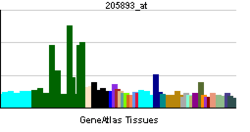NLGN1
| View/Edit Human | View/Edit Mouse |
Neuroligin-1 is a protein that in humans is encoded by the NLGN1 gene.[4][5][6]
This gene encodes a member of the neuroligin family of neuronal cell surface proteins. Neuroligin-1 acts as splice site-specific ligand for β-neurexins and has been shown to localize to the postsynaptic compartment at excitatory synapses and is involved in the formation and remodeling of central nervous system synapses.[6][7]
Interactions
NLGN1 has been shown to interact with NRXN1[8][9] and DLG4.[10]
See also
References
- ↑ "Diseases that are genetically associated with NLGN1 view/edit references on wikidata".
- ↑ "Human PubMed Reference:".
- ↑ "Mouse PubMed Reference:".
- ↑ Philibert RA, Winfield SL, Sandhu HK, Martin BM, Ginns EI (April 2000). "The structure and expression of the human neuroligin-3 gene". Gene. 246 (1–2): 303–10. doi:10.1016/S0378-1119(00)00049-4. PMID 10767552.
- ↑ Nagase T, Kikuno R, Ishikawa K, Hirosawa M, Ohara O (April 2000). "Prediction of the coding sequences of unidentified human genes. XVII. The complete sequences of 100 new cDNA clones from brain which code for large proteins in vitro". DNA Research. 7 (2): 143–50. doi:10.1093/dnares/7.2.143. PMID 10819331.
- 1 2 "Entrez Gene: NLGN1 neuroligin 1".
- ↑ Scheiffele P, Fan J, Choih J, Fetter R, Serafini T (June 2000). "Neuroligin expressed in nonneuronal cells triggers presynaptic development in contacting axons". Cell. 101 (6): 657–69. doi:10.1016/S0092-8674(00)80877-6. PMID 10892652.
- ↑ Comoletti D, Flynn R, Jennings LL, et al. (December 2003). "Characterization of the interaction of a recombinant soluble neuroligin-1 with neurexin-1beta". The Journal of Biological Chemistry. 278 (50): 50497–505. doi:10.1074/jbc.M306803200. PMID 14522992.
- ↑ Ichtchenko K, Nguyen T, Südhof TC (February 1996). "Structures, alternative splicing, and neurexin binding of multiple neuroligins". The Journal of Biological Chemistry. 271 (5): 2676–82. doi:10.1074/jbc.271.5.2676. PMID 8576240.
- ↑ Irie M, Hata Y, Takeuchi M, et al. (September 1997). "Binding of neuroligins to PSD-95". Science. 277 (5331): 1511–5. doi:10.1126/science.277.5331.1511. PMID 9278515.
Further reading
- Cantallops I, Cline HT (September 2000). "Synapse formation: if it looks like a duck and quacks like a duck ..". Current Biology. 10 (17): R620–3. doi:10.1016/S0960-9822(00)00663-1. PMID 10996085.
- Ichtchenko K, Hata Y, Nguyen T, et al. (May 1995). "Neuroligin 1: a splice site-specific ligand for beta-neurexins". Cell. 81 (3): 435–43. doi:10.1016/0092-8674(95)90396-8. PMID 7736595.
- Ichtchenko K, Nguyen T, Südhof TC (February 1996). "Structures, alternative splicing, and neurexin binding of multiple neuroligins". The Journal of Biological Chemistry. 271 (5): 2676–82. doi:10.1074/jbc.271.5.2676. PMID 8576240.
- Irie M, Hata Y, Takeuchi M, et al. (September 1997). "Binding of neuroligins to PSD-95". Science. 277 (5331): 1511–5. doi:10.1126/science.277.5331.1511. PMID 9278515.
- Kikuno R, Nagase T, Ishikawa K, et al. (June 1999). "Prediction of the coding sequences of unidentified human genes. XIV. The complete sequences of 100 new cDNA clones from brain which code for large proteins in vitro". DNA Research. 6 (3): 197–205. doi:10.1093/dnares/6.3.197. PMID 10470851.
- Scheiffele P, Fan J, Choih J, Fetter R, Serafini T (June 2000). "Neuroligin expressed in nonneuronal cells triggers presynaptic development in contacting axons". Cell. 101 (6): 657–69. doi:10.1016/S0092-8674(00)80877-6. PMID 10892652.
- Strausberg RL, Feingold EA, Grouse LH, et al. (December 2002). "Generation and initial analysis of more than 15,000 full-length human and mouse cDNA sequences". Proceedings of the National Academy of Sciences of the United States of America. 99 (26): 16899–903. doi:10.1073/pnas.242603899. PMC 139241
 . PMID 12477932.
. PMID 12477932. - Comoletti D, Flynn R, Jennings LL, et al. (December 2003). "Characterization of the interaction of a recombinant soluble neuroligin-1 with neurexin-1beta". The Journal of Biological Chemistry. 278 (50): 50497–505. doi:10.1074/jbc.M306803200. PMID 14522992.
- Ota T, Suzuki Y, Nishikawa T, et al. (January 2004). "Complete sequencing and characterization of 21,243 full-length human cDNAs". Nature Genetics. 36 (1): 40–5. doi:10.1038/ng1285. PMID 14702039.
- Gerhard DS, Wagner L, Feingold EA, et al. (October 2004). "The Status, Quality, and Expansion of the NIH Full-Length cDNA Project: The Mammalian Gene Collection (MGC)". Genome Research. 14 (10B): 2121–7. doi:10.1101/gr.2596504. PMC 528928
 . PMID 15489334.
. PMID 15489334. - Chubykin AA, Liu X, Comoletti D, Tsigelny I, Taylor P, Südhof TC (June 2005). "Dissection of synapse induction by neuroligins: effect of a neuroligin mutation associated with autism". The Journal of Biological Chemistry. 280 (23): 22365–74. doi:10.1074/jbc.M410723200. PMID 15797875.
- Muzny DM, Scherer SE, Kaul R, et al. (April 2006). "The DNA sequence, annotation and analysis of human chromosome 3". Nature. 440 (7088): 1194–8. doi:10.1038/nature04728. PMID 16641997.
- Li X, Zhang J, Cao Z, Wu J, Shi Y (September 2006). "Solution structure of GOPC PDZ domain and its interaction with the C-terminal motif of neuroligin". Protein Science. 15 (9): 2149–58. doi:10.1110/ps.062087506. PMC 2242614
 . PMID 16882988.
. PMID 16882988.
This article is issued from Wikipedia - version of the 6/3/2016. The text is available under the Creative Commons Attribution/Share Alike but additional terms may apply for the media files.
